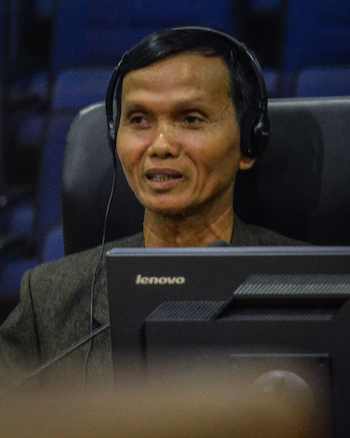Khmer Rouge soldiers in Prey Veng province largely focused on farming and infrastructure projects after the regime took power, a former fighter told the Extraordinary Chambers in the Courts of Cambodia on Wednesday. That was until East Zone leader Sao Phim appeared in mid-1978 and called them to fight against the regime or die at its hands, he said.
The former soldier, whose identity was concealed due to being a witness in other cases at the tribunal, said his unit had been tirelessly building canals and roads in the province since the Khmer Rouge took power in April 1975.

This came to an end when Sao Phim personally visited the provincial city one evening in mid-1978 to deliver news to the soldiers that the zone had been accused of colluding with the Vietnamese to overthrow Pol Pot, he said.
“Sao Phim said himself, the southwest and western soldiers came to surround the eastern soldiers with the aim of killing them,” the witness said.
“They said that through Sao Phim’s movement, the East Zone colluded with the Yuon side,” he said, using a term for Vietnamese people. “He asked us what we wanted to do—whether we wanted to be killed or we wanted to rise up.”
Claims that the Democratic Party of Kampuchea was riddled with internal conflicts have formed the basis for the defense team of Nuon Chea, Pol Pot’s second-in-command, who say that the leaders were not responsible for many atrocities committed under the regime.
Under questioning by Nuon Chea’s attorney, Victor Koppe, the witness denied knowledge of any allegiance between the East Zone and Vietnam prior to the accusations shared by Sao Phim.
“At the time, I was simply a rank and file soldier or combatant in my unit. I was not aware of certain matters during the time,” he said.
Within a week of the leader’s announcement, his cadre had followed his advice and taken up arms. Leaflets calling for the troops to join with south and southwest zones were dropped from planes as fighting broke in the region, which was quickly devastated by tanks and shelling, the witness said.
Sao Phim had used radio broadcasts to encourage the resistance, but then “we were overwhelmed by the forces and after that could no longer hear his voice on the radio,” he said.
Around that time, another commander informed him that Sao Phim had committed suicide, and the witness said he soon fled to Svay Rieng’s Romeas Hek district, where he was arrested by Khmer Rouge soldiers along with 30 others from Prey Veng.
After a week of hard labor and interrogation, he said, those who denied collusion with the Vietnamese were allowed to return to their communes, while others were killed.
“We were told that we were not traitors. They said we were the children of the regime, and the traitors were only Sao Phim” and the commander’s wife, he said.
Even after being freed, however, the witness said he continued to suffer at the hands of the Khmer Rouge, losing 50 members of his immediate and extended family. He said he became disabled, was arrested once again, was shot in the arm, and was forced into a marriage with a woman whose name he had never heard.



